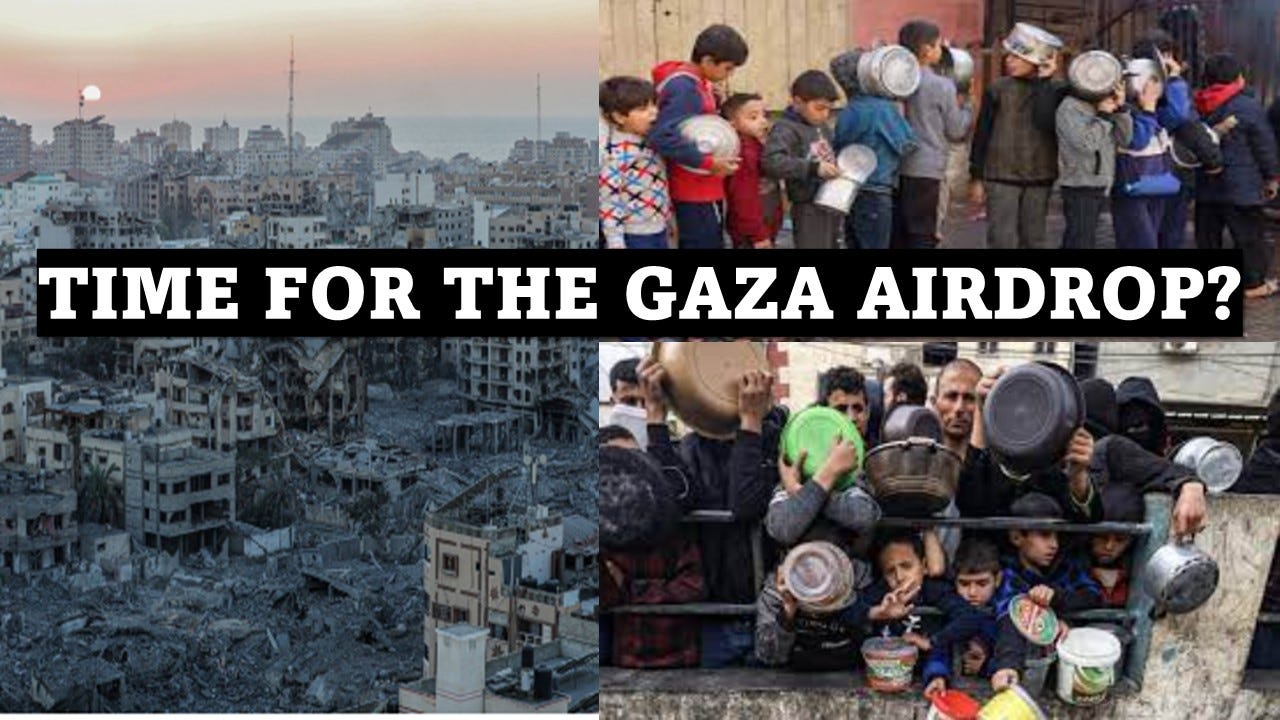Time for the Gaza Airdrop?
Article written in 2008
At the start of this year President Bush called on Israel to end its 40-year occupation of the West Bank. This was the first time that a sitting US President had urged Israel to comply with UN resolution 123.
But in the five months that have elapsed since that momentous occasion, what has been the Israeli reaction on the ground to Mr. Bush’s call?
Sadly, the answer to that question tells us a great deal about both Israel’s attitude towards the so-called ‘peace process’ as well as the US President’s waning authority in the Middle East.
In fact since the announcement a few months ago Israel has continued to reduce life in the Gaza strip to new levels of hardship. The situation got so bad in March that thousands of Palestinians broke down the border crossing at Rafah in order to stock up on food in Egypt. Moreover the UN food agency suspended its relief operations in April because of fuel shortages caused by Israel’s blockade of essential items.
None of these events in Gaza elicited a reaction from the Bush administration – any more than did the killing of 35 Palestinians, including three children, due to Israeli shelling in March. Or Israel’s decision to cut off power supplies to Gaza’s main hospital. This last move brought a mild rebuke from the UN but nothing, it should be noted, from the Bush administration, which continued to focus on the much quieter West Bank.
The lack of any US concern at the deteriorating human rights situation in Gaza or even a recognition that Israel’s collective punishment of the Palestinians is illegal according to ‘international law’ not only presents a moral dilemma for the rest of the world. But its unwillingness or inability to put any real pressure on Israel also raises questions about the future of the US role in this volatile region.
With Hezbollah entrenched in Lebanese politics and Iraqi premier Nuri al-Maliki increasingly assertive US foreign policy may well be marginalized in the near term.
In that event it would be prudent for Arab states to prepare for, if not a post-US Middle East, then a Middle East with a much weaker US presence. Clearly this is a factor that also needs to be incorporated into the region’s thinking on the Israel-Palestinian issue.
Arab and Muslim states need to do more to deter Israel in its actions in Gaza, independently of the US. And options do exist.
On the diplomatic front they could deter Israel’s ‘genocidal tendencies’ (Richard Falk the new American Jewish UN rapporteur) by rolling back on Israel’s recognition in the Muslim world. They could also urge other states to do likewise.
A renewed ban on Israelis at all sporting events in the Middle East would also be a start. For, make no mistake, sport is extremely important to Israel’s image on the world stage (as anyone who has seen the way that Israelis will attempt to link themselves to Muslim tennis stars will attest (Marat Safin in 2001 and Qureshi of Pakistan being prime examples over the past decade).
But besides attempts to punish or deter Israel in its actions in Gaza direct relief to the territory may also become essential in the longer term. In fact the situation in Gaza is not dissimilar to the siege of West Berlin by the USSR in 1948 (of course there are differences too: e.g. the USSR didn’t randomly bomb Berlin every few days or shoot hundreds of German children - but for the sake of argument we will skate over Israel’s special brand of brutality).
Airdrops of essential foodstuffs to Gaza may not seem a practical idea at the moment (the UN FRA only suspended its operations temporarily not abandoned them altogether) but other ways of getting relief to the territory need to be explored. It is not difficult to envisage that further sieges of Gaza may occur in the years and decades to come. The salient point here is that Muslim states need to prepare themselves for the worst – a real crisis in Gaza sometime in the future - and a world in which the US is even more impotent than it is now.
This article was written by Farooq Ali in April 2008. Farooq Ali was murdered at Ramada by Wyndham Hotel in Islamabad on 11-12th March 2022. He was a postgraduate of Imperial College London (Biochemistry) but blacklisted in the UK. He wrote politically under a pen name. The trial into his murder is now commencing after refusal to investigate by Islamabad Police and repeated obstruction by the British authorities (FCDO) with attacks on Farooq’s two sisters in the UK. Follow us on Twitter/X @Justice4Farooq



